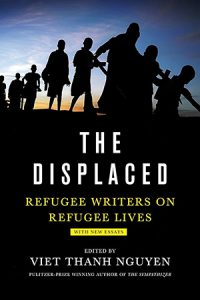The Displaced: Refugee Writers on Refugee Lives (with New Essays)

Editor: Viet Thanh Nguyen
Publisher: Abrams Press
Year of Publication: 2018
Print Length: 192 pages
Genre: Non-Fiction / Autobiography or Memoir
Topic: Asylum & Asylum Seekers, Refugees & Forced Migration, Asylum & Refugee System, Migrants, Migration, Lived Experience, Testimonies, Exile & Exodus, Borders, Camps, Movement of People and Ideas, Freedom to Move and to Stay, Fundamental Rights and Liberties, Legality & Illegality, Poverty, Challenges & Opportunities, Future Scenarios, Children & Childhood, Youth & Youthhood, Hope, Resilience
The Pulitzer Prize–winning author of The Sympathizer, Viet Thanh Nguyen, called on 17 fellow refugee writers from across the globe to shed light on their experiences, and the result is The Displaced, a powerful dispatch from the individual lives behind current headlines.
Today the world faces an enormous refugee crisis: 68.5 million people fleeing persecution and conflict from Myanmar to South Sudan and Syria, a figure worse than the flight of Jewish and other Europeans during World War II and beyond anything the world has seen in this generation. Yet in the United States, United Kingdom, and other countries with the means to welcome refugees, anti-immigration politics and fear seem poised to shut the door. Even for readers seeking to help, the sheer scale of the problem renders the experience of refugees hard to comprehend.
Viet Nguyen, called “one of our great chroniclers of displacement” (Joyce Carol Oates, The New Yorker), brings together writers originally from Mexico, Bosnia, Iran, Afghanistan, Soviet Ukraine, Hungary, Chile, Ethiopia, and elsewhere to make their stories heard. They are formidable in their own right—MacArthur Genius grant recipients, National Book Award and National Book Critics Circle Award finalists, filmmakers, speakers, lawyers, professors, and The New Yorker contributors—and they are all refugees, many as children arriving in London and Toronto, Oklahoma and Minnesota, South Africa and Germany. Their 17 contributions are as diverse as their own lives have been, and yet hold just as many themes in common.
Reyna Grande questions the line between “official” refugee and “illegal” immigrant, chronicling the disintegration of the family forced to leave her behind; Fatima Bhutto visits Alejandro Iñárritu’s virtual reality border crossing installation “Flesh and Sand”; Aleksandar Hemon recounts a gay Bosnian’s answer to his question, “How did you get here?”; Thi Bui offers two uniquely striking graphic panels; David Bezmozgis writes about uncovering new details about his past and attending a hearing for a new refugee; and Hmong writer Kao Kalia Yang recalls the courage of children in a camp in Thailand.
Table of Contents
1. Introduction — Viet Thanh Nguyen
2. The Road — Chris Abani
3. Last, First, Middle — Joseph Azam
4. Common Story — David Bezmozgis
5. Flesh and Sand — Fatima Bhutto
6. Perspective and What Gets Lost — Thi Bui
7. How Succulent Food Defeated Trump’s Wall Before It Has Been Built — Ariel Dorfman
8. Guests of the Holy Roman Empress Maria Theresa — Lev Golinkin
9. The Parent Who Stays — Reyna Grande
10. To Walk in Their Shoes — Meron Hadero
11. God’s Fate — Aleksandar Hermon
12. Second Country — Joseph Kertes
13. 13 Ways of Being an Immigrant — Porochista Khakpour
14. Refugees and Exiles —Marina Lewycka
15. This Is What the Journey Does — Maaza Mengiste
16. The Ungrateful Refugee — Dina Nayeri
17. Am I a Refugee? — Raja Shehadeh
18. A Refugee Again — Vu Tran
19. New Lands, New Selves — Nuvuyo Rosa Tshuma
20. Refugee Children: The Yang Warrios — Kao Kalia Yang
List of Contributors

Viet Thanh Nguyen is a University Professor, Aerol Arnold Chair of English, and Professor of English, American Studies and Ethnicity, and Comparative Literature at the University of Southern California. He is the author of Race and Resistance: Literature and Politics in Asian America (Oxford University Press, 2002) and the novel The Sympathizer, from Grove/Atlantic (2015). The Sympathizer won the 2016 Pulitzer Prize for Fiction, the Dayton Literary Peace Prize, an Edgar Award for Best First Novel from the Mystery Writers of America, the First Novel Prize from the Center for Fiction, and numerous other awards. He was born in Ban Mê Thuột, Viet Nam (now spelled Buôn Mê Thuột after 1975, a year which brought enormous changes to many things, including the Vietnamese language). He came to the United States as a refugee in 1975 with his family and was initially settled in Fort Indiantown Gap, Pennsylvania, one of four such camps for Vietnamese refugees. From there, he moved to Harrisburg, Pennsylvania, where he lived until 1978.
Source: https://vietnguyen.info/author-viet-thanh-nguyen
More from Viet Thanh Nguyen in this library, click here.
